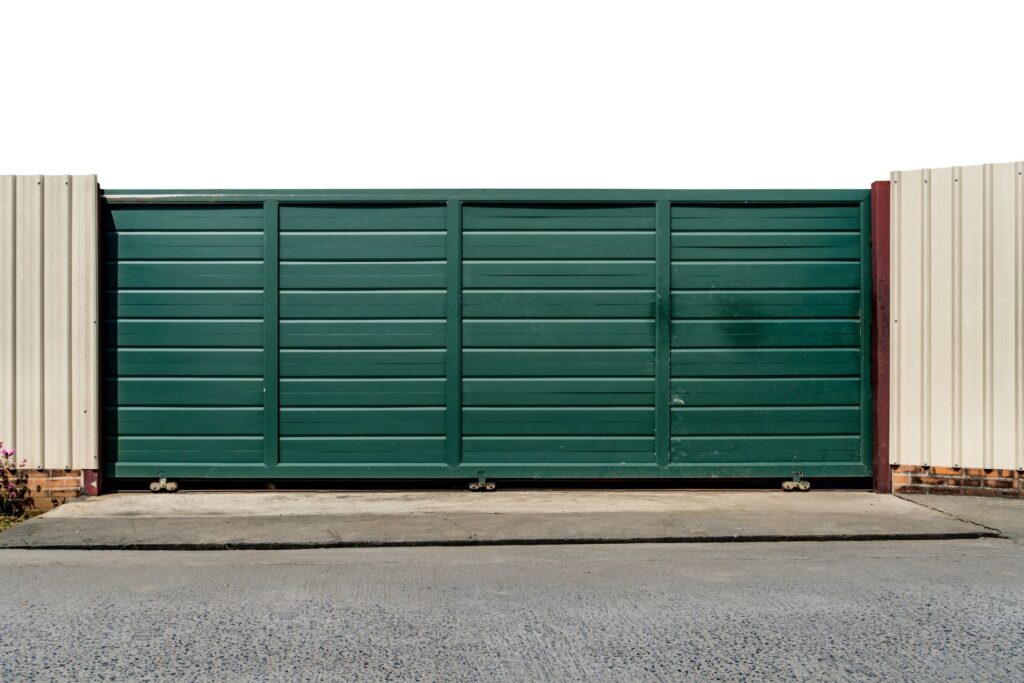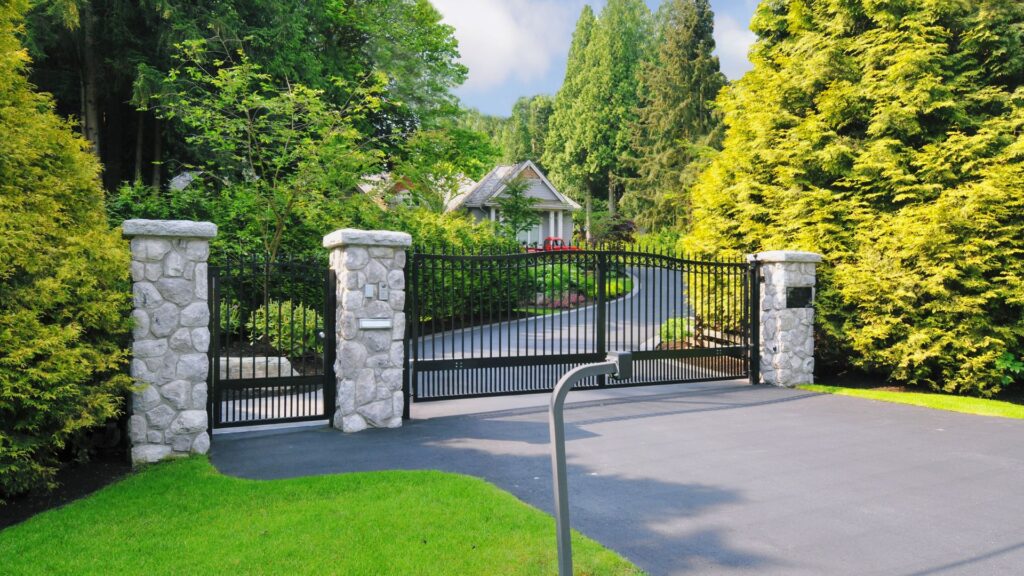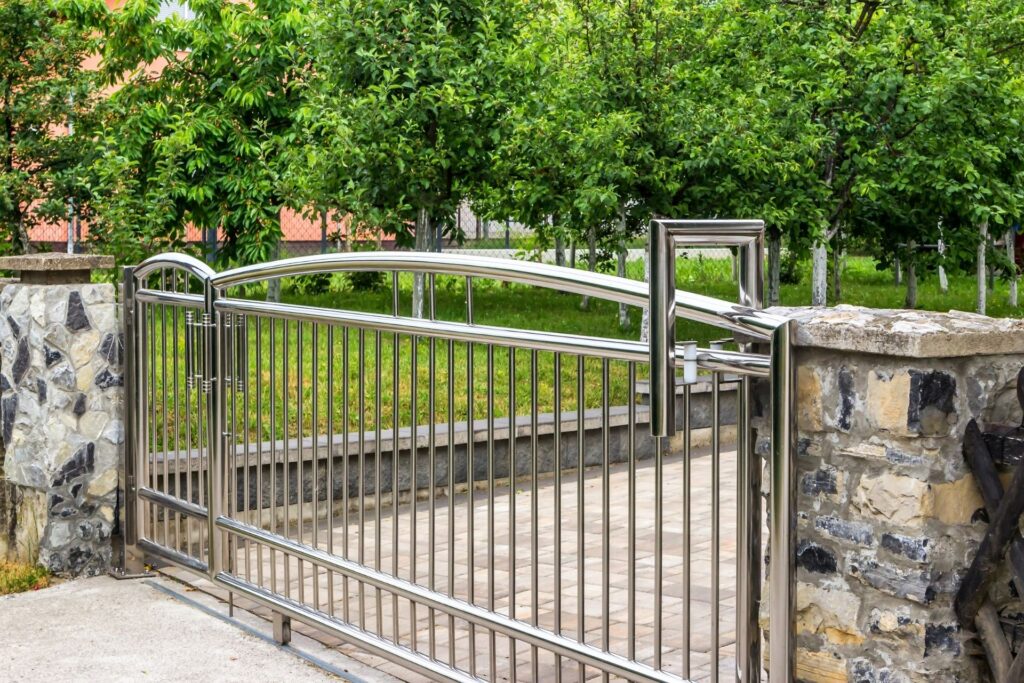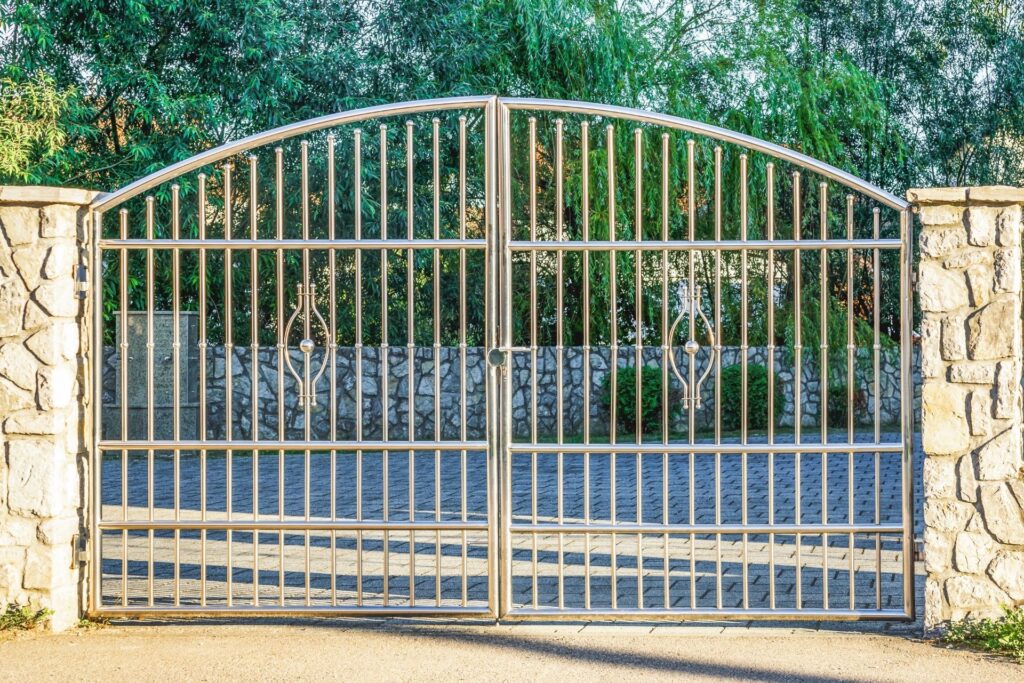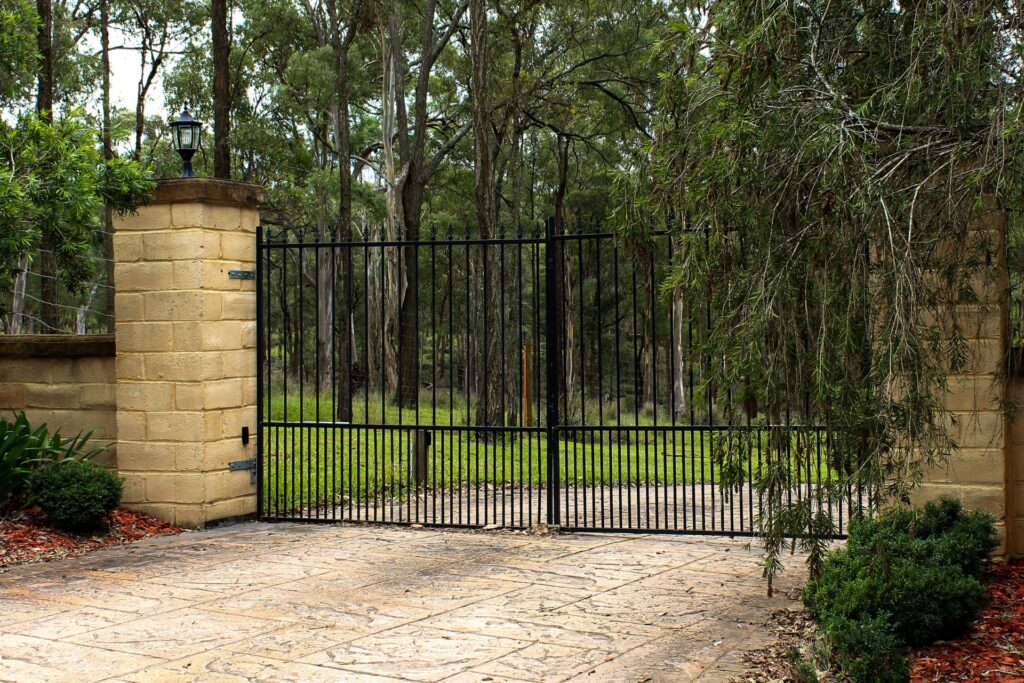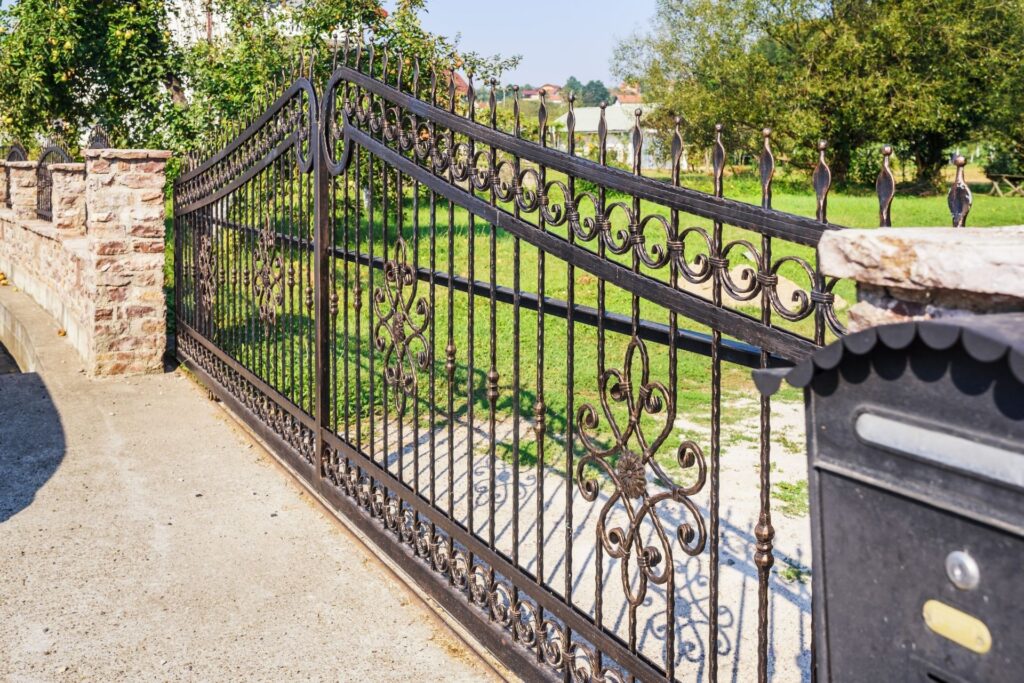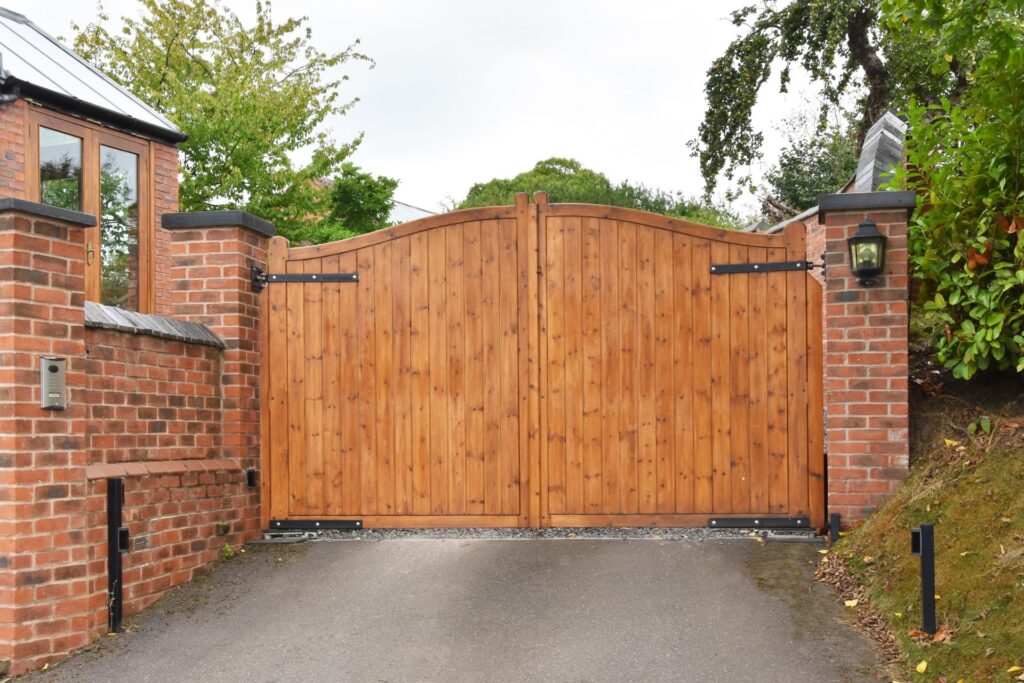Welcome to your ultimate guide on selecting the right standard driveway gate width in New Zealand! Whether you’re building a new home, upgrading your security, or simply enhancing your curb appeal, choosing the correct gate width is a key decision that impacts not only the look of your property but also its functionality. In this post, we’ll cover everything you need to know—from standard gate measurements and regulatory guidelines to practical tips on customizing your gate to fit your unique needs. Let’s dive in and help you make an informed choice that works for your home and lifestyle in NZ.
The standard driveway gate width in New Zealand typically ranges from 3 to 4 meters for single gates and 4.5 to 6 meters for double gates, depending on the property size and vehicle requirements. Custom gates can be designed to accommodate wider access, ensuring both security and convenience for various types of vehicles.
Table of Contents
Why Driveway Gate Width Matters
When planning your driveway gate, one of the first considerations should be the width of the gate itself. The width is not just a matter of measurement but a crucial factor that affects everything from daily convenience to long-term security and aesthetic appeal. Understanding why gate width matters can help you make a more informed decision that aligns with your needs and enhances the functionality of your property.
Access and Convenience
A primary reason to carefully consider your driveway gate’s width is access and convenience. The gate must be wide enough to comfortably accommodate the types of vehicles that will frequently enter and exit your property. Standard cars, for instance, generally require a gate width of at least 10 feet to pass through comfortably. However, if you own larger vehicles, such as trailers, RVs, or if you frequently receive deliveries from trucks, you might need a gate that’s 12 feet wide or more.
Having a gate that’s too narrow can lead to practical difficulties in maneuvering vehicles through it, which can be frustrating and may even cause damage to both the vehicle and the gate. Additionally, consider future needs; for instance, if you might buy a larger vehicle or start receiving bigger deliveries. Planning for the widest reasonable width from the start can save you significant alterations or replacements down the line.
Security Considerations
The width of your driveway gate also plays a vital role in your property’s security. Gates that are too wide might offer too much access, potentially making it easier for unauthorized vehicles or even groups of people to enter the property simultaneously, complicating security measures. On the other hand, a gate that’s too narrow could be seen as a vulnerable point, easy to breach by forcing vehicles through or by damaging the structure.
A well-proportioned gate, combined with appropriate security features like cameras, lights, and an intercom system, can enhance security by controlling access while ensuring that emergency vehicles can gain entry when necessary. It’s a delicate balance between making your home accessible to necessary traffic and creating a barrier against potential threats.
Aesthetic and Functional Balance
Finally, the gate’s width should complement the overall aesthetics of your property while meeting functional requirements. A driveway gate is often one of the first things people notice about your home, so its appearance is important. A gate that is too wide for the driveway can look disproportionate and may detract from the property’s curb appeal. Conversely, a gate that is too narrow might look skimpy and insubstantial, which could undermine the aesthetic value of your home’s facade.
Finding the right balance often means considering the architectural style of your home, the size of the property, and how the gate will look alongside existing fences or walls. It should enhance the property’s character, not detract from it. Consulting with a designer or an architect can provide insights into the most visually pleasing and functional gate dimensions for your specific setting.
In conclusion, choosing the right width for your driveway gate involves a careful consideration of practical access needs, security implications, and aesthetic balance. By addressing these factors, you can ensure that your gate serves as a functional asset and an enhancement to your property’s overall charm and security strategy.
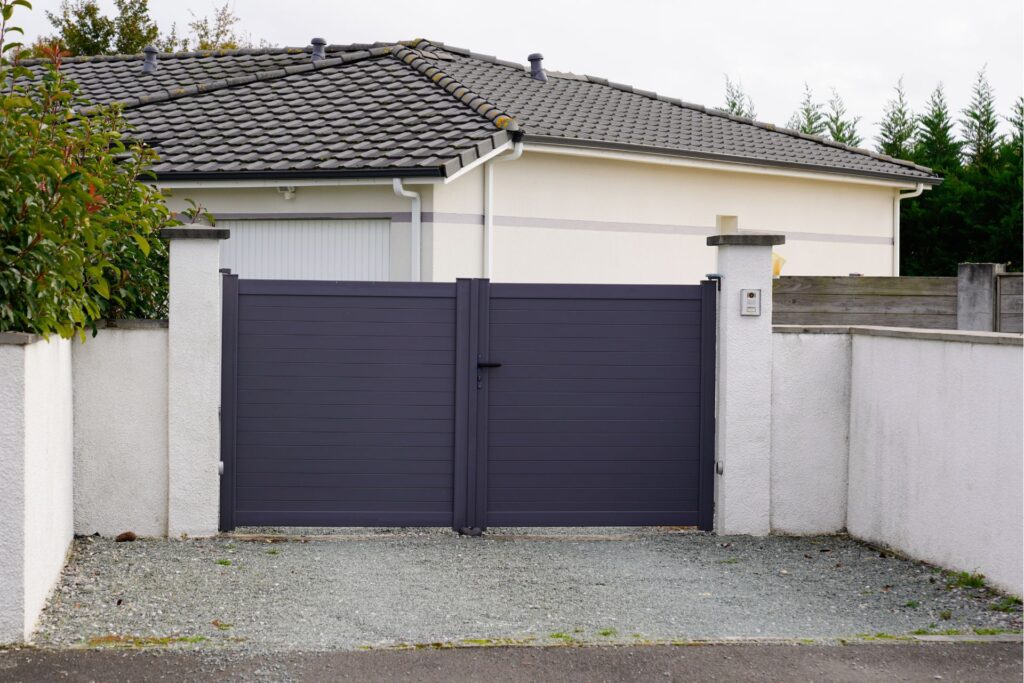
Standard Driveway Gate Widths In NZ
When planning to install a driveway gate in New Zealand, understanding the standard widths can help ensure smooth vehicle access while complying with local regulations. Driveway gates not only enhance the security and privacy of your property but also add to its aesthetic appeal. Here, we’ll explore the typical measurements for driveway gates, regulatory guidelines that impact gate dimensions, and the influence of materials on the design and functionality of driveway gates.
Typical Measurements
Driveway gate widths in New Zealand are designed to accommodate various types of vehicles, from personal cars to larger service vehicles. The standard dimensions are usually categorized into three types:
- Single Gates: Typically range from 3 to 4 meters. These gates are ideal for smaller properties or where driveway space is limited. They provide ample space for everyday vehicles without requiring a large area for the gate to swing open or slide.
- Double Gates: These are more extensive, ranging from 4.5 to 6 meters. Double gates are suitable for properties with wider driveways and provide easier access for larger vehicles or multiple cars entering and exiting simultaneously. They are preferred for their grand appearance and practical functionality.
- Custom Gates: For those with specific needs or larger vehicles, custom gate widths that exceed 6 meters are also available. Custom gates allow for personalization in design and size to perfectly match the property’s requirements and owner’s preferences.
Regulatory Guidelines
In New Zealand, driveway gate installations are subject to local council regulations, especially concerning vehicle access and safety. These regulations ensure that the gates do not obstruct public pathways or roads and are safe for all users, including pedestrians and cyclists. Building codes also dictate the structural integrity and durability of the gates to withstand local environmental conditions. It’s advisable to consult with your local council for detailed guidelines specific to your area before commencing installation to ensure compliance and avoid potential legal issues.
Popular Materials
The choice of material for driveway gates can significantly influence their width, durability, and aesthetic appeal. Here are some commonly used materials:
- Wood: Wooden gates offer a classic and warm look, enhancing the property’s natural aesthetic. However, the width and design may be limited by the type of wood and its susceptibility to weather conditions.
- Aluminum: Known for its rust resistance and lightweight properties, aluminum gates can be wider without placing additional strain on the supporting structures. They are versatile in design and require minimal maintenance.
- Steel: For maximum security and durability, steel gates are an excellent choice. They can support wider dimensions due to their strength but are heavier and may require more robust mechanisms and supports.
When selecting the material, consider the maintenance requirements, the typical weather conditions in your area, and the overall design of your property. Each material offers unique benefits and challenges, so choose one that aligns with your security needs, aesthetic preferences, and budget.
By considering these factors—standard measurements, regulatory guidelines, and material choices—you can select the ideal driveway gate width that combines functionality, compliance, and style, enhancing the value and security of your property in New Zealand.
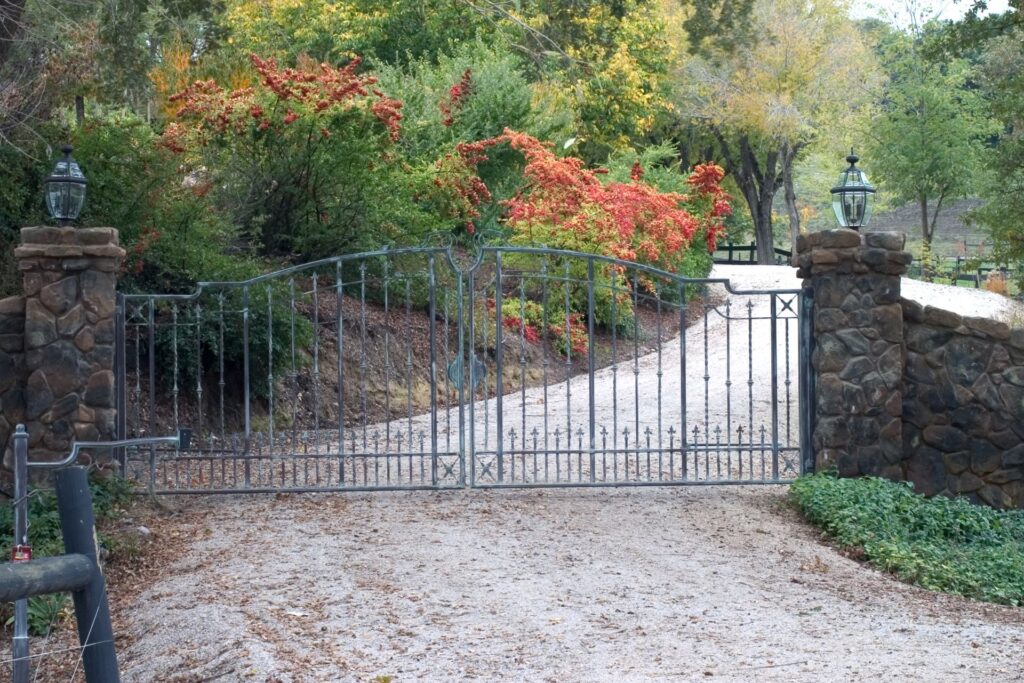
Factors To Consider When Choosing Your Gate Width
When planning to install a gate, choosing the right width is crucial for functionality and aesthetic appeal. Here’s a detailed exploration of the key factors you should consider to ensure your gate serves its purpose while complementing your property’s layout and design.
Vehicle Size and Type
The primary function of a gate is often to allow vehicle access, so it’s essential to consider the types and sizes of vehicles that will use it. Whether you’re accommodating small family cars, larger trucks, or even boats, the gate width must facilitate easy passage. A practical tip is to measure the widest vehicle that will access your property and then add a margin for error. For instance, if the widest vehicle is 2 meters wide, consider a gate width of at least 2.5 meters to ensure smooth entry and exit. It’s also wise to consider future needs—perhaps a larger vehicle or different types like caravans might be in your future plans.
Property Size and Layout
The physical characteristics of your property play a significant role in determining the ideal gate width. For properties with narrow driveways or those situated on sloped land, wider gates might pose challenges. In such cases, precision in measurement and possibly opting for a sliding gate can make better use of limited space. Evaluate the approach to your gate: Are there sharp bends leading up to it? Is the area sloped? Answers to these questions can guide the maximum practical width of your gate, ensuring it’s both functional and aesthetically pleasing without overwhelming the property’s layout.
Pedestrian Access
Consideration for pedestrians is often overlooked when discussing gate widths. If your property frequently receives visitors who come on foot, incorporating a pedestrian gate alongside the main gate offers convenience and security. This smaller gate allows easy access for walkers, possibly when the main gate is closed, and enhances the overall functionality of your entrance. Positioning and the choice between an integrated smaller gate or a separate pedestrian gate should be considered based on how often it will be used and the available space.
Customization Options
Customization is a fantastic way to ensure your gate not only meets functional requirements but also reflects your personal style and complements your home’s exterior. In New Zealand, many suppliers offer bespoke gate solutions that can be tailored to the specific needs of your driveway and aesthetic desires. Whether you prefer a modern design with clean lines or a more ornate style with intricate details, custom gates can be designed to any specification. Additionally, material choices such as wood, metal, or even composite materials can influence both the look and the width of your gate.
By thoroughly assessing these factors, you can choose a gate width that accommodates your needs while enhancing your property’s safety and curb appeal. Remember, the gate is often one of the first impressions people have of your home, so it’s worth investing the time to get it right.
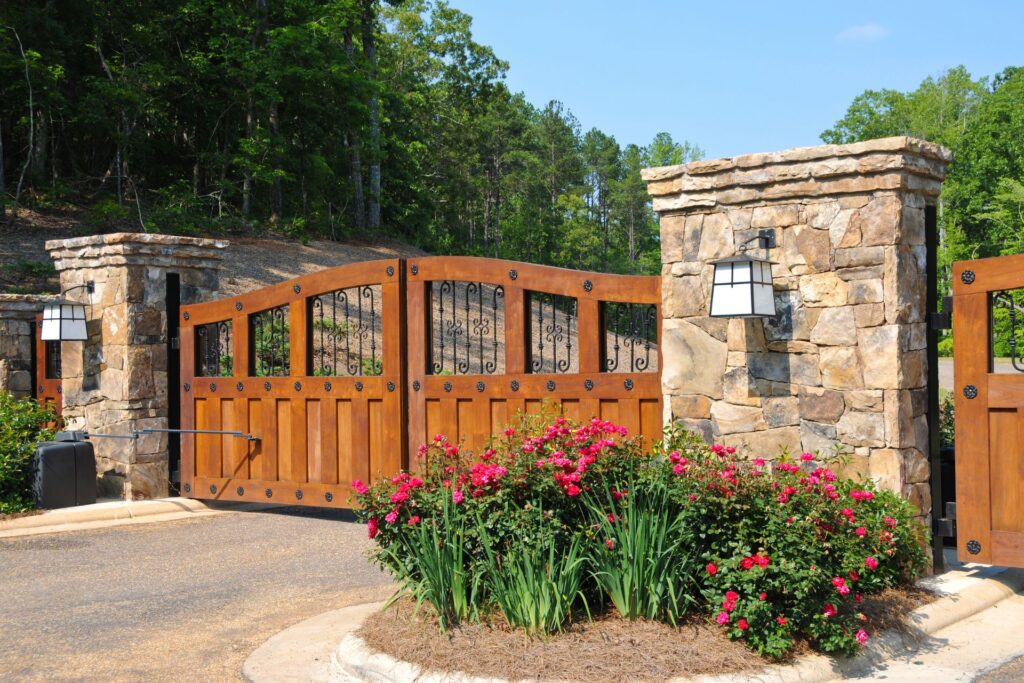
Pros And Cons Of Different Gate Widths
When it comes to enhancing your property’s functionality and aesthetics, choosing the right gate width is crucial. Not only does the gate serve as a security feature, but it also impacts the daily usability of the space and even the overall property value. Here, we delve into the advantages and disadvantages of various gate widths, from narrow options to wider ones, to help you make an informed decision tailored to your specific needs.
Narrow Gates (Under 3 meters)
Pros
Narrow gates are typically seen as more space-efficient. Their compact size is especially beneficial for smaller properties where space is at a premium. By opting for a gate under 3 meters, homeowners can maximize their usable yard space, which is a significant advantage in urban areas. Additionally, the cost of a narrow gate is generally lower due to less material usage and potentially simpler installation requirements.
Cons
However, the limitations of narrow gates become apparent when considering accessibility. These gates may restrict access for larger vehicles such as SUVs, moving vans, or emergency service vehicles, which could be a logistical issue. Moreover, if there are any plans for future property upgrades that might require heavy machinery access, a narrow gate could complicate or even hinder such processes, making them less future-proof.
Standard Gates (3-4.5 meters)
Pros
Standard gate widths, ranging from 3 to 4.5 meters, strike a balance between accessibility and cost-efficiency, making them suitable for most residential properties. These gates are wide enough to accommodate a variety of vehicles, from family cars to emergency vehicles, without sacrificing much in terms of space or cost. This versatility makes the standard gate a go-to choice for many homeowners.
Cons
On the flip side, the installation and planning of standard gates require careful consideration. Ensuring that the gate aligns properly with the driveway and does not impede any public pathways or neighbor’s property can be a challenge. The need for precise installation means that homeowners might need to invest in professional services to avoid potential issues such as misalignment or inadequate swinging space.
Wide Gates (Over 4.5 meters)
Pros
Wide gates, measuring over 4.5 meters, are the epitome of accessibility and convenience. They are ideal for properties that require frequent access by large vehicles, such as those in rural areas or homes that receive regular deliveries. For properties with significant outdoor activities, such as landscaping projects or large gatherings, a wide gate ensures that vehicles and equipment can easily enter and exit without restrictions.
Cons
The primary drawback of wide gates is their higher cost. Larger gates require more materials and often more complex installation procedures, including the need for additional support structures to ensure stability and long-term usability. Moreover, the aesthetic impact of a very wide gate on a smaller or medium-sized property can be overwhelming, potentially affecting the property’s visual appeal.
By understanding the pros and cons of different gate widths, homeowners can better assess what fits their current and future needs. Whether you prioritize cost-efficiency, space utilization, or accessibility, the right gate can significantly enhance the functionality and security of your property.
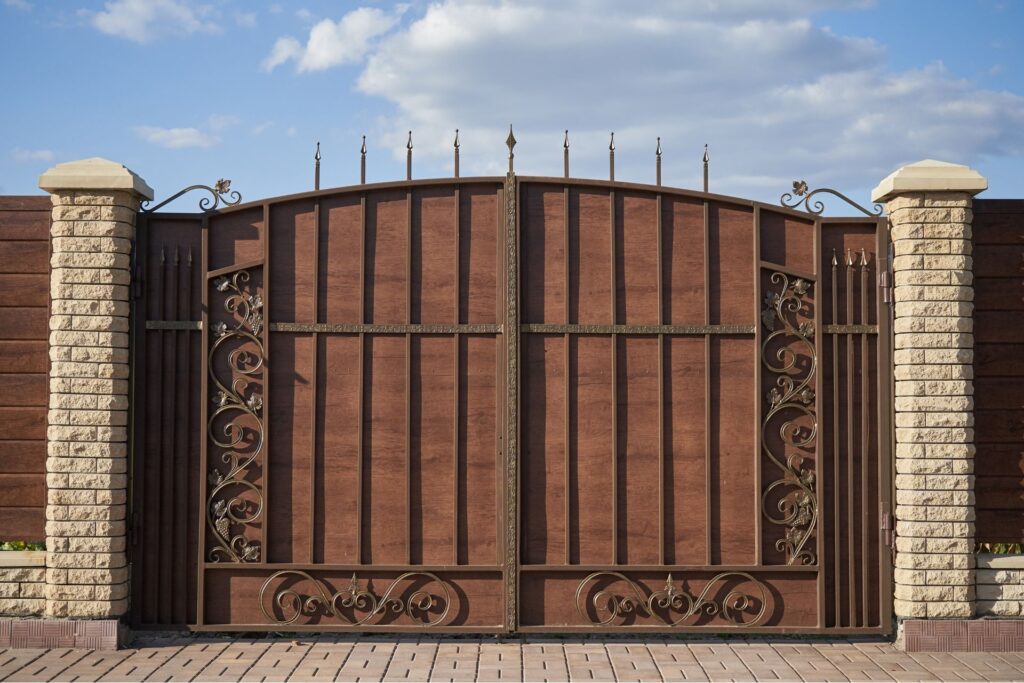
Driveway Gate Types And Their Impact On Width
When planning the entrance to your property, selecting the right type of driveway gate is crucial not only for aesthetic appeal but also for functional space management. The type of gate you choose can significantly impact the required width of your driveway, influencing everything from daily convenience to the accessibility of larger vehicles. Let’s delve into the various gate types and understand their specific width requirements and installation considerations.
Swing Gates
Swing gates are among the most traditional and widely used gate types for driveways. They operate by swinging open either inward or outward, requiring a clear area for their arc of movement. The key factor to consider with swing gates is the clearance space:
- Clearance Requirements: Swing gates typically require more space than other types because they need a free arc to swing open without obstruction. This means the overall width of the driveway must accommodate not just the gate itself but also the space it sweeps through during operation. Landscaping, nearby walls, or other structures must be set back adequately to avoid interference.
- Single vs. Double Swing Gates: The choice between a single or a double swing gate usually hinges on the width of the driveway and personal preference. Single gates are suitable for narrower entrances but can be quite long, making them heavier and sometimes more challenging to operate manually. Double gates, consisting of two shorter leaves, are easier to manage and reduce the space needed for the swing path but require a central post or pillar that may split the driveway’s entry point.
Sliding Gates
For properties with limited space that cannot accommodate the arc of a swing gate, sliding gates offer a compact and efficient alternative. They slide horizontally along the driveway and are excellent for maximizing entry width without requiring additional clearance space:
- Space Efficiency: Sliding gates are particularly advantageous for tight spaces. Since they move laterally, they require no extra driveway width for operation, making them ideal for urban homes or small entryways where space is at a premium.
- Installation Considerations: Installing a sliding gate involves setting up a track that extends across the driveway’s width. The length of the track should be at least twice the width of the gate to allow it to fully open. Additionally, motorization is a popular option for sliding gates, enhancing convenience and security. Choosing the right motor will depend on the gate’s weight and the frequency of use.
Bi-Fold and Other Specialty Gates
Bi-fold gates, telescopic gates, and other specialty types are designed to offer flexibility and innovation in managing driveway space. These gates are particularly useful where both space and access width are critical concerns:
- Bi-Fold Gates: These gates fold in sections, much like an accordion, reducing the swing radius needed and allowing for a wider opening than traditional swing gates. They are ideal for carports or garages where space is limited but large vehicle access is necessary.
- Telescopic Gates: Telescopic gates consist of multiple sections that slide over one another, compacting into a small area on one side of the driveway. They are a smart choice for very wide driveways where a large opening is required but swinging or standard sliding gates are impractical due to space constraints.
Choosing the right gate type can dramatically affect not only the aesthetics of your driveway but also its functionality and the ease of access to your property. Consider the space available, the size and type of vehicles that will use the driveway, and your personal convenience and security preferences when selecting a driveway gate. With the right planning and consideration, you can enhance both the beauty and the practicality of your home entrance.
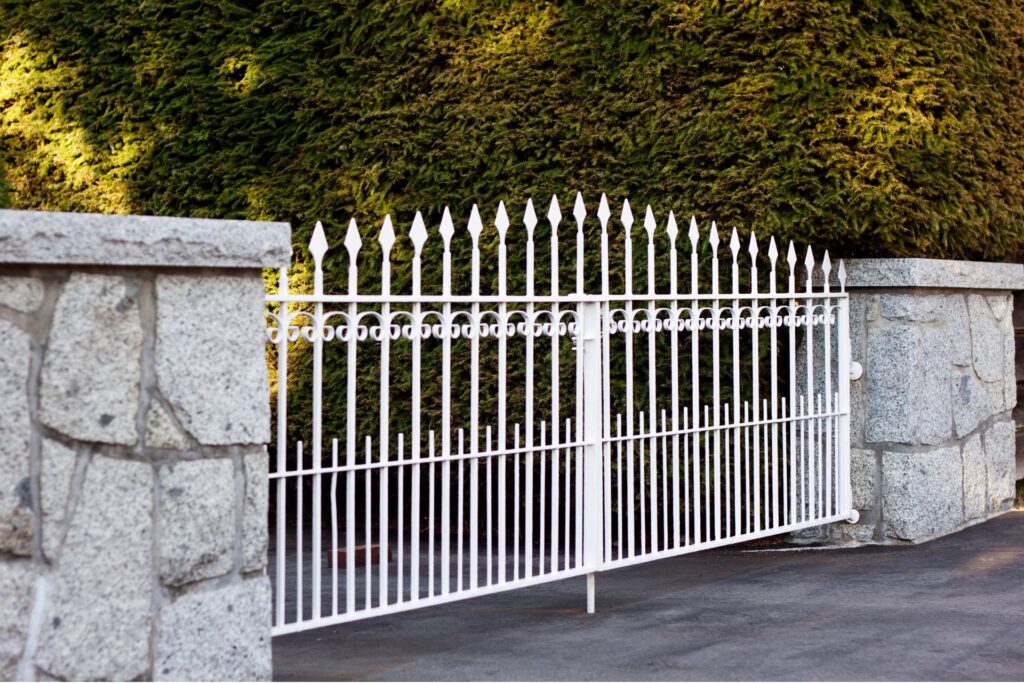
Installation And Costs In NZ
When considering the addition of a driveway gate to your property in New Zealand, understanding the installation process and associated costs is crucial for making an informed decision. This section will guide you through each step of the installation, provide a detailed cost breakdown for various gate options, and highlight the ongoing maintenance considerations.
Installation Process
Step 1: Site Preparation
Before any gate installation begins, the site must be properly prepared. This includes measuring the entrance to ensure the gate fits perfectly and clearing any obstacles such as rocks, trees, or uneven ground. Leveling the site and establishing a stable foundation are essential to prevent future issues such as sagging or misalignment.
Step 2: Material Selection
Choosing the right material for your gate is pivotal. Common materials include wood, metal (such as wrought iron or aluminum), and vinyl. Each material has its benefits and aesthetic appeal, but also varies in durability, security, and maintenance needs.
Step 3: Professional Installation Services
Professional installation ensures that your gate operates smoothly and lasts longer. Experts will handle everything from setting the posts securely into the ground to ensuring the gate’s automation and security features are properly configured. Engaging a professional also usually includes a warranty, providing peace of mind.
Cost Breakdown
Gate Types and Widths
Costs vary significantly based on the type of gate (single vs. double) and the materials chosen. Here’s what you can expect:
- Single Gates: Ideal for narrower entries, single gates are less expensive due to their smaller size and simpler mechanism. Prices can start from approximately NZD 1,200 and increase based on material and design complexity.
- Double Gates: Suitable for wider entrances, double gates are more costly but offer greater convenience and a grander appearance. Starting prices are typically around NZD 2,000, escalating with higher-end materials and customizations.
Material Costs
- Wood gates are typically the most cost-effective, especially if opting for local species, but require regular maintenance.
- Metal gates, while more expensive initially, provide enhanced security and longevity. Aluminum offers a rust-resistant, lighter alternative to iron.
- Vinyl, though less common, offers a middle-ground in terms of cost and maintenance, resistant to weather and pests.
Installation and Labor Fees
Installation costs can vary widely but expect to pay between NZD 500 to NZD 1,500, depending on the complexity of the installation and the type of gate. This price includes labor and the necessary hardware.
Additional Features
Automation systems can add NZD 500 to NZD 2,000 to the total cost, depending on the sophistication of the system. Security features like cameras and access controls may also increase the budget but provide peace of mind and enhance property value.
Ongoing Maintenance Considerations
The type of material and the climate in your area will largely dictate maintenance needs. Wooden gates require staining or painting every few years to maintain their appearance and integrity. Metal gates might need occasional rust treatment and lubrication of moving parts. Vinyl gates are relatively low maintenance, needing only regular cleaning with soap and water to keep them looking new.
Regular checks and maintenance not only extend the life of your gate but also ensure it functions correctly and remains secure. Setting aside a small budget for annual upkeep can help avoid larger expenses down the road.
By understanding these factors—installation, costs, and maintenance—you can better plan for a driveway gate that enhances your home’s curb appeal and functionality.
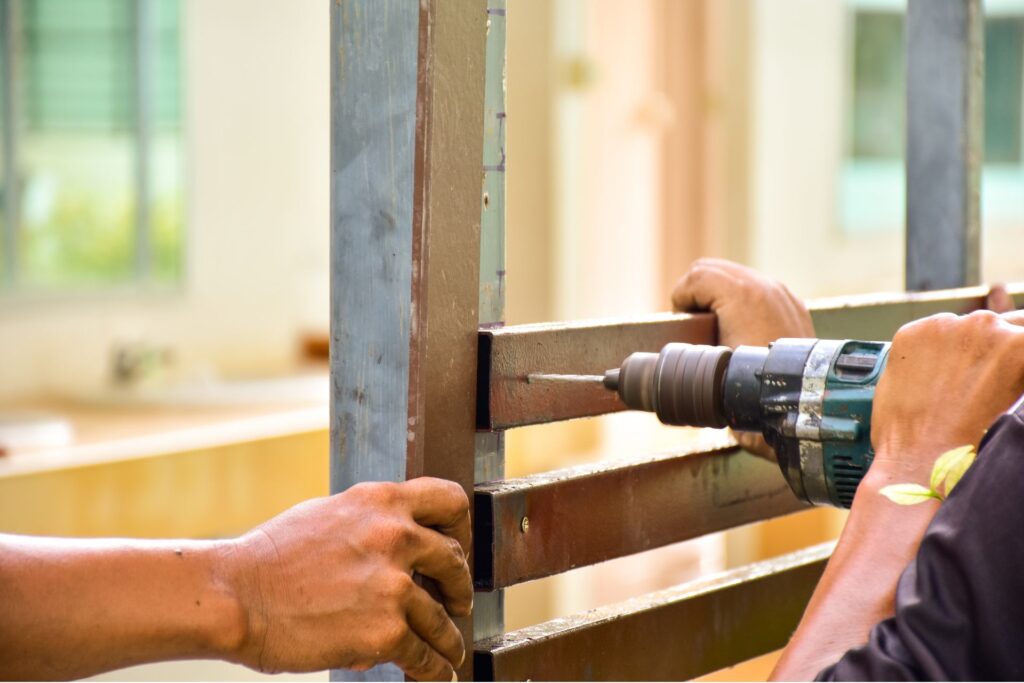
Customization And Future-Proofing Your Gate
When it comes to enhancing the functionality and aesthetic appeal of your home, the gateway serves as a focal point that not only secures your property but also sets the tone for your home’s design and usability. Customizing and future-proofing your gate involves thoughtful consideration of your current and future needs, ensuring it remains functional and stylish for years to come.
Personalization Options
Personalizing your gate is more than just choosing a design; it’s about adapting it to your lifestyle and future plans. Homeowners have numerous customization options to ensure their gate not only matches the architectural style of their home but also caters to evolving needs. For instance, the width of the gate is a crucial aspect to consider. It should be wide enough to accommodate larger vehicles you may purchase in the future or to provide comfortable access for service vehicles like moving trucks or emergency responders.
Additionally, incorporating decorative elements can enhance your property’s curb appeal and increase its value. Whether it’s elegant ironwork, charming wood designs, or modern composite materials, each element can be tailored to reflect your personal taste while considering practical functionalities.
When planning for a gate, think about the long-term. Will your family grow, or might you need more space for hobbies that require large equipment? A gate that’s customizable for width adjustments or modular in design can save you significant alteration costs down the line.
Smart Gate Technology
In the age of smart home technology, gates have also seen innovative advancements. Smart gate solutions, such as automated opening systems or remote control access, provide convenience and security. These technologies often require specific considerations regarding gate design and width. For example, the installation of certain automation systems might need extra space on either side of the gate for the mechanisms to fit without hindering the gate’s operation.
Investing in smart technology also means thinking about power supply solutions and the potential need for regular maintenance checks to keep the technology running smoothly. Choose systems that are compatible with other smart home devices you have or plan to install, creating a cohesive and manageable smart home environment.
Planning for Future Expansion
Future-proofing your gate is crucial in accommodating potential lifestyle changes or property upgrades. If there’s a possibility of widening your driveway or adding new access points in the future, choosing a gate that can be adapted or extended is wise. This might involve selecting a design that can be symmetrically or asymmetrically expanded or installing additional panels that can be added later.
When selecting your gate, consider materials and designs that are not only durable but also adaptable. Some materials are easier to modify and expand than others, with metal and wood being among the most flexible for future alterations.
Moreover, engaging with a professional who can provide insights based on your property’s layout and your personal needs can lead to better decision-making. They can offer advice on zoning regulations that might affect future expansions and suggest the best ways to integrate new gate sections without compromising the original design aesthetics.
Customizing and future-proofing your gate is a strategic approach to ensuring it meets your aesthetic desires and functional requirements over time. By considering personalization options, integrating smart technology, and planning for future expansions, you not only enhance your property’s security and appeal but also invest in a solution that grows with your changing needs.
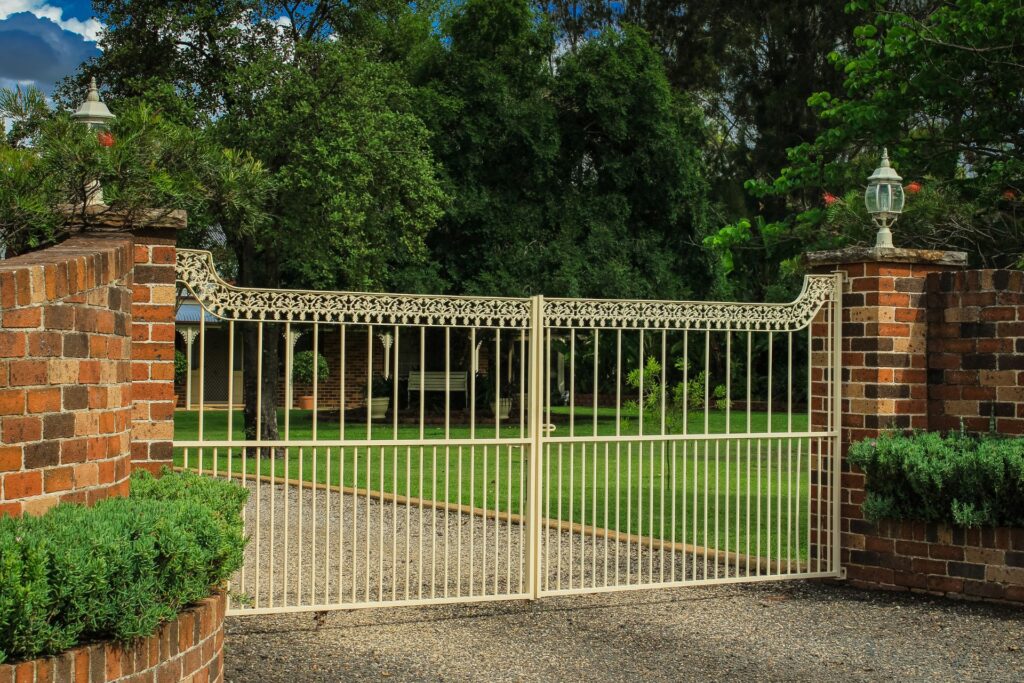
Top Driveway Gate Suppliers And Installers In NZ
When it comes to enhancing the security and curb appeal of your property, selecting the right driveway gate is crucial. In New Zealand, homeowners have access to a variety of reputable suppliers and installers who can provide tailored solutions to meet diverse needs. In this section, we will explore some of the top driveway gate suppliers and installers across the nation, as well as provide insights on what factors you should consider to make an informed choice.
Featured Suppliers
1. GateCrafters – Known for their craftsmanship and high-quality materials, GateCrafters offers a wide range of designs from classic wrought iron to modern aluminum gates. They also provide automated gate systems for added convenience.
2. SecureGates NZ – Specializing in security, SecureGates NZ provides robust gate solutions with integrated security features like CCTV and intercom systems. They are a great choice for those prioritizing safety along with style.
3. Custom Gates and Fences – As the name suggests, this company excels in custom-made gates. If you’re looking for a gate that perfectly matches the architecture of your home, they are the go-to supplier.
4. Elegant Gates – Offering a blend of aesthetics and durability, Elegant Gates focuses on designs that complement the scenic beauty of New Zealand landscapes. Their gates are also eco-friendly, appealing to environmentally conscious consumers.
5. Automation Experts Ltd. – Ideal for tech-savvy homeowners, this supplier specializes in automated and smart gate systems that can be controlled via smartphone apps, ensuring convenience and security.
What to Look For in a Supplier
Choosing the right driveway gate supplier involves more than just picking a name from a list. Here are some key aspects to consider:
- Reputation: Start by looking at online reviews and testimonials. A supplier with consistently positive feedback is likely a safe bet. Check out platforms like Google Reviews and local forums for unbiased opinions.
- Customization Options: Your driveway gate should be a reflection of your personal style and the character of your property. Look for suppliers who offer customization options that allow you to tailor designs, materials, and finishes to your liking.
- Price: While it’s important not to compromise on quality, you should also ensure that you’re getting good value for your money. Get quotes from multiple suppliers to compare prices, but remember, the cheapest option isn’t always the best. Consider what’s included in the price, such as installation and any after-sales services.
- Experience and Expertise: Experienced suppliers are more likely to provide high-quality, reliable installations. Check how long the company has been in business and their expertise with different types of gates.
- After-Sales Service: Good after-sales support can make all the difference. Ensure that the supplier offers solid warranties and maintenance services. This is crucial for the longevity and functionality of your gate.
By considering these factors, you can choose a driveway gate supplier in New Zealand that not only meets your aesthetic and security needs but also provides the best overall value and service. Whether you prefer a sleek, modern design or a more traditional look, there’s a supplier out there that can bring your vision to life, ensuring your driveway is as welcoming as it is secure.
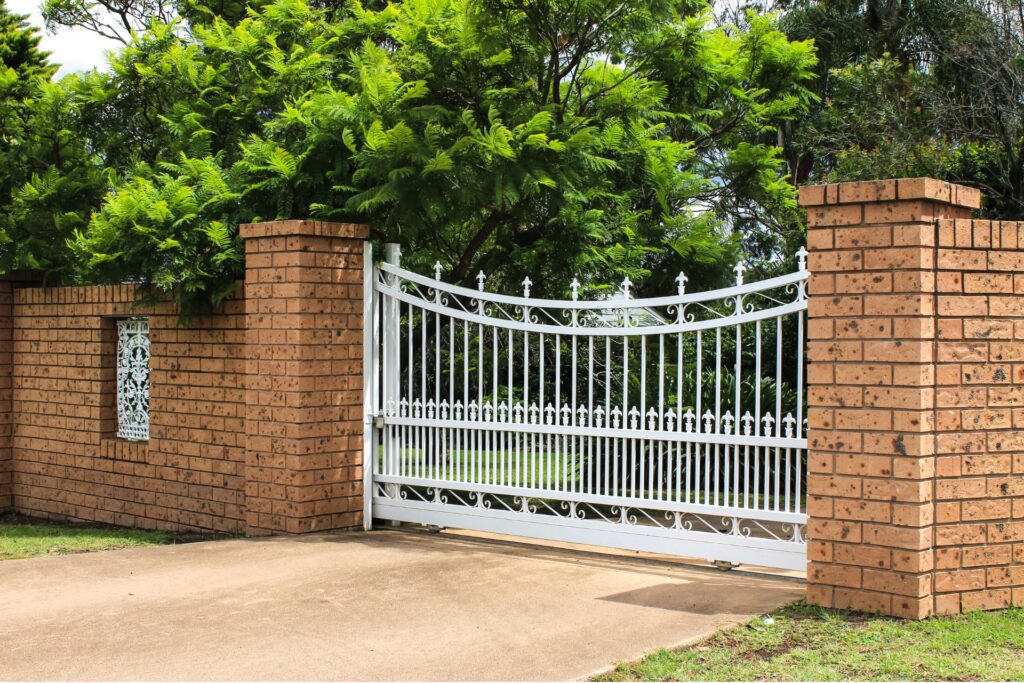
FAQs: About Standard Driveway Gate Width Nz
What is the standard width for a driveway gate in New Zealand?
The standard width for a driveway gate in New Zealand typically ranges from 3 to 4 meters for single gates and 4.5 to 6 meters for double gates. These measurements can vary based on the size of the property and the types of vehicles that need access.
Do I need council approval for my driveway gate in NZ?
In some cases, you may need council approval depending on the gate’s height, placement, and the area you live in. It’s advisable to check with your local council or a professional installer to ensure your driveway gate complies with New Zealand regulations.
What factors should I consider when choosing a driveway gate width?
When selecting a driveway gate width, consider factors such as the size of your property, the type and size of vehicles needing access, the layout of your driveway, and whether or not you want pedestrian access. Larger gates may also require additional space for installation.
Can I customize the width of my driveway gate?
Yes, you can customize the width of your driveway gate to suit your specific needs. Custom gate widths are ideal for properties with unique layouts or larger vehicles like trucks, boats, or RVs.
How much does it cost to install a driveway gate in New Zealand?
The cost of installing a driveway gate in New Zealand varies depending on the material, gate width, type (swing, sliding, etc.), and whether it includes features like automation. On average, you can expect to pay anywhere from $1,500 to $5,000 or more for a professionally installed gate.
What is the difference between swing and sliding gates in terms of width?
Swing gates generally require more space to open and close, meaning you may need to account for extra clearance. Sliding gates, on the other hand, are ideal for narrower driveways as they don’t require additional opening space but still allow for wide access.
What materials are most commonly used for driveway gates in NZ?
Common materials used for driveway gates in New Zealand include wood, steel, aluminum, and wrought iron. Each material has its own benefits in terms of durability, aesthetics, and cost. Steel and aluminum are popular for their strength and low maintenance.
Can a narrow driveway accommodate a wide gate?
It depends on the layout of your driveway. While a narrow driveway may limit your options for wider gates, bi-fold or telescopic gates can offer wide access without requiring a lot of space to open. Consulting with a gate specialist can help you determine the best solution for your space.
Is automation available for all gate widths?
Yes, automation can be added to most gate widths, whether they are swing, sliding, or bi-fold gates. The cost and complexity of automation will vary based on the width, weight, and type of gate, but it’s a popular feature for added convenience and security.
How do I maintain my driveway gate to ensure longevity?
Maintenance requirements will vary depending on the material of your gate. For example, wooden gates may need regular sealing or painting, while metal gates might require rust prevention and lubrication of moving parts. Regular inspections and cleaning can help extend the life of your gate.
Conclusion
Choosing the right standard driveway gate width in New Zealand is essential for both current functionality and future flexibility. When recapping the key points, it’s crucial to remember that the ideal gate width will not only accommodate your immediate needs, such as the size of your vehicle, but also any potential future requirements like larger vehicles or additional access needs. Planning ahead is more than just practical; it’s about ensuring your property evolves seamlessly with your lifestyle. By considering both today’s needs and tomorrow’s possibilities, you can make a well-informed decision that ensures convenience, safety, and adaptability for years to come.
About the Author:
Mike Veail is a recognized digital marketing expert with over 6 years of experience in helping tradespeople and small businesses thrive online. A former quantity surveyor, Mike combines deep industry knowledge with hands-on expertise in SEO and Google Ads. His marketing strategies are tailored to the specific needs of the trades sector, helping businesses increase visibility and generate more leads through proven, ethical methods.
Mike has successfully partnered with numerous companies, establishing a track record of delivering measurable results. His work has been featured across various platforms that showcase his expertise in lead generation and online marketing for the trades sector.
Learn more about Mike's experience and services at https://theleadguy.online or follow him on social media:

